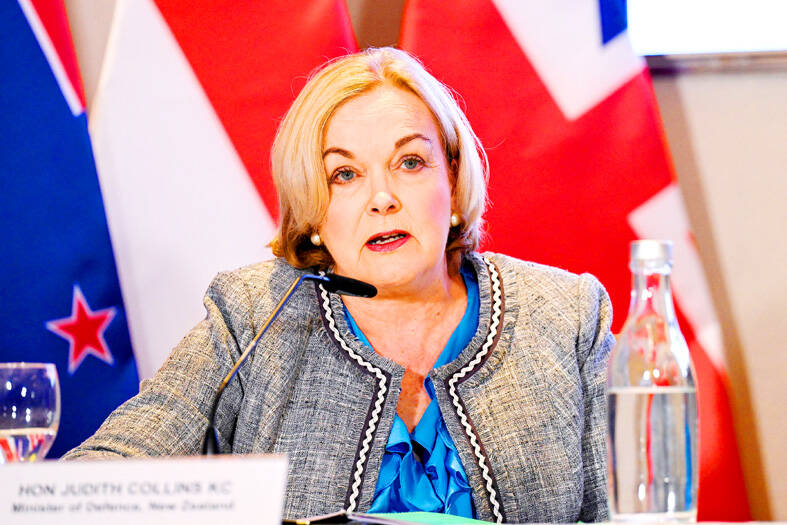The New Zealand government yesterday said it would pass legislation next year to prevent entities that “do not share the country’s values” from using it as a base to monitor satellites.
The nation’s location and clear skies make it a good place to launch and monitor satellites from, with the European Space Agency among those keeping an eye on space from New Zealand.
However, New Zealand’s intelligence service in September raised concerns about some foreign entities wanting to develop space infrastructure, which would have “assisted foreign military activity that could have harmed New Zealand interests.”

Photo: Reuters
The report did not say which country or countries’ military would have benefited if the plans went ahead.
However, the report said China remains a complex intelligence concern, but added that are other states that undertake malicious activity in New Zealand as well.
“The new regulations are intended to prevent the establishment or use of ground-based space infrastructure in New Zealand by entities that do not share our values or interests,” including the country’s national security interests, New Zealand Minister for Space Judith Collins said in a statement.
New Zealand has a small commercial space industry that is growing fast with government support.
A report released by the New Zealand National Intelligence Service said that New Zealand organizations have been approached by a small number of entities seeking to develop space infrastructure in the nation’s territory.
“These entities often claim the infrastructure will be used for civilian research purposes, but it was subsequently found in each case that what was proposed could have assisted foreign military activity that could have harmed New Zealand’s interests,” said the report, titled New Zealand Security Threat Environment.

THE TRAGEDY OF PUNCH: Footage of the seven-month-old Japanese macaque has gone viral online after he was rejected by his mother and formed a bond with a soft toy A baby monkey in Japan has captured hearts around the world after videos of him being bullied by other monkeys and rejected by his mother went viral last week. Punch, a Japanese macaque, was born in July last year at Ichikawa City Zoo. He has drawn international attention after zookeepers gave him a stuffed orangutan toy after he was abandoned by his mother. Without maternal guidance to help him integrate, Punch has turned to the toy for comfort. He has been filmed multiple times being dragged and chased by older Japanese macaques inside the enclosure. Early clips showed him wandering alone with

South Korea would soon no longer be one of the few countries where Google Maps does not work properly, after its security-conscious government reversed a two-decade stance to approve the export of high-precision map data to overseas servers. The approval was made “on the condition that strict security requirements are met,” the South Korean Ministry of Land, Infrastructure and Transport said. Those conditions include blurring military and other sensitive security-related facilities, as well as restricting longitude and latitude coordinates for South Korean territory on products such as Google Maps and Google Earth, it said. The decision is expected to hurt Naver and Kakao

Australian Prime Minister Anthony Albanese yesterday said he did not take his security for granted, after he was evacuated from his residence for several hours following a bomb threat sent to a Chinese dance group. Albanese was evacuated from his Canberra residence late on Tuesday following the threat, and returned a few hours later after nothing suspicious was found. The bomb scare was among several e-mails threatening Albanese sent to a representative of Shen Yun, a classical Chinese dance troupe banned in China that is due to perform in Australia this month, a spokesperson for the group said in a statement. The e-mail

TENSIONS: The march went ahead without clashes, but arrests were still possible as police investigate suspects behind Nazi salutes, racist slurs and homophobic insults Thousands of people on Saturday marched in southeastern France under heavy security in tribute to a far-right activist whose killing, blamed on the hard left, has put the country on edge. The crowd — many wearing black and some covering their lower faces with masks — marched through the city of Lyon carrying flowers and placards bearing pictures of Quentin Deranque and the words: “justice for Quentin” and “the extreme left kills.” The 23-year-old died from head injuries following clashes between radical left and far-right supporters on the sidelines of a demonstration against a politician from the left-wing France Unbowed